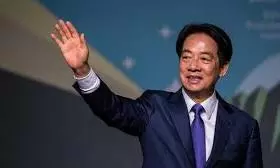
Ready to work with Beijing, says Taiwan's President
text_fieldsThree days after Lai Ching-te was sworn in as Taiwan's new president, Chinese warships and fighter jets surrounded Taiwan in military drills, which China described as a test of its capability to seize the island.
Despite these actions, President Lai expressed his willingness to cooperate with China, stating on Sunday, "I also look forward to enhancing mutual understanding and reconciliation through exchanges and cooperation with China... and moving towards a position of peace and common prosperity."
Lai emphasized the importance of regional stability, stating, "I want Taiwan and China to jointly shoulder the important responsibility of regional stability." He spoke at an event in Taipei, reflecting his continued openness to dialogue despite the military pressure.
Communications between China and Taiwan were cut off in 2016 after former President Tsai Ing-wen took office, pledging to uphold Taiwan's sovereignty. Lai, a member of the same Democratic Progressive Party (DPP) as Tsai, has promised to continue her policies of strengthening Taiwan's defense while being open to dialogue with China and enhancing relations with the island's partners, especially the United States.
However, China viewed Lai's inaugural speech on Monday as a call for independence, with defence ministry spokesman Wu Qian stating, "Every time 'Taiwan independence' provokes us, we will push our countermeasures one step further, until the complete reunification of the motherland is achieved."
In a show of support, the United States' de facto embassy announced that Republican Congressman Michael McCaul would lead a delegation to visit Taiwan from Sunday to Thursday to discuss "US-Taiwan relations, regional security, trade and investment."
Taiwan's presidential spokesperson Wen Lii noted that the delegation would meet with Lai on Monday, adding that the visit "conveys an expression of support for the new administration and the people of Taiwan through concrete actions."
During the recent drills, Chinese state broadcaster CCTV reported that fighter jets and bombers conducted exercises targeting key locations, with Tong Zhen from China's Academy of Military Sciences stating that the drills targeted "the ringleaders and political centre of 'Taiwan independence'."
President Lai's first week in office also saw significant domestic challenges, with tens of thousands protesting against bills proposed by the opposition Kuomintang and the Taiwan People's Party. DPP lawmakers accused the opposition of rushing the bills, which aim to expand parliamentary powers, without proper consultation.
With the DPP no longer holding a majority in parliament, Lai's administration faces difficulties in passing policies, including increasing the defense budget. Amanda Hsiao of the International Crisis Group remarked, "The pressures are coming fast and early for the Lai administration... This is going to be a major test of their ability to manage multiple challenges, domestic and external, at the same time."























